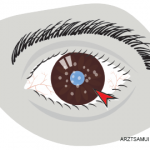Patients and families view such clinics favorably because they are convenient; decrease burdens associated with missed school and work days, transportation and childcare for other children; and allow clinical care decisions to be made during the appointment.
Psychosocial Aspects
Effective management of chronic diseases also requires an appreciation of how disease and complex treatment regimens impact a child’s daily functioning and quality of life (QOL). Uveitis and sight-threatening complications can significantly affect vision-specific functioning and QOL.44 Systemic immunosuppression and side effects, frequent and painful eye drops in the home and school, and recurrent visits with subspecialists can prove burdensome.
Most studies in pediatric uveitis focus on pathologic processes and outcomes, and place less emphasis on the child’s and family’s perspective on disease and treatment burden, as well as the effects of visual disability. Therefore, we developed the first uveitis-specific tool for children 5–18 years old that assesses vision-related function and QOL, “Effects of Youngsters’ Eyesight on Quality of Life” (EYE-Q). The EYE-Q questionnaire provides valuable insight into visual disability secondary to uveitis that is not generally measured by more general QOL instruments.45-47
Improvements in the assessment of the clinical significance of uveitis and the effects of visual impairment and treatment would improve disease management, visual outcomes and, importantly, QOL.
Summary
Uveitis is a chronic inflammatory eye disease that may lead to sight-threatening complications and significantly impact visual functioning and QOL among children with JIA. Known risk factors exist for uveitis and poor visual outcomes, but more work must be done to determine predictive biomarkers we can use clinically. Regularly scheduled ophthalmology screening in children with JIA and close monitoring in children diagnosed with uveitis are essential to maintain eye health. Close collaboration and communication between rheumatology and ophthalmology are crucial to improve visual outcomes. And future research is needed to elucidate clinical and genetic risk factors, biomarkers associated with uveitis susceptibility and visual outcomes, and the impact of disease and treatment on function and QOL.
Joseph McDonald, MD, is a pediatric rheumatology fellow at Cincinnati Children’s Hospital Medical Center. He completed his pediatric residency at the University of Cincinnati.
Virginia A. Miraldi Utz, MD, is an assistant professor of pediatric ophthalmology at the Abrahamson Pediatric Eye Institute at Cincinnati Children’s Hospital Medical Center. She is a pediatric ophthalmologist with subspecialty training and expertise in the field of ocular inflammation and uveitis.
Sheila T. Angeles-Han, MD, MS, is an associate professor of pediatrics at Cincinnati Children’s Hospital Medical Center and the University of Cincinnati. Dr. Han is a pediatric rheumatologist with a clinical and research interest in ocular inflammatory diseases.
Disclosures
Dr. McDonald has no potential conflicts to disclose.


